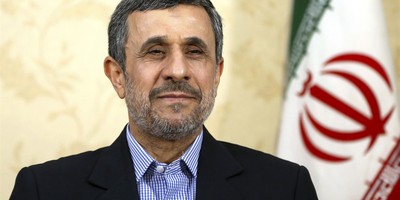Despite the recent spate of major bestsellers touting the virtues of atheism, polls show consistent, stubborn reluctance on the part of the public to cast their votes for a presidential candidate who denies the existence of God.
A typical result came from the Zogby Poll of January 21, 2008, indicating that 50% of voters rule out supporting “a presidential candidate who doesn’t believe in God”; only 20% said they could definitely vote for such a contender. Meanwhile, an overwhelming majority of 78% (86% of women and 67% of men) say they take a “positive view” of candidates citing Scripture when discussing political problems.
It’s no accident that all three remaining Presidential contenders speak passionately and extensively about their faiths and all three (McCain, Obama, Clinton) identify themselves as serious, faithful, regularly praying Christians. Meanwhile, the members of Congress may hardly qualify as saintly or angelic, but of the 535 men and women in the House and Senate, only one (the shameless radical rabble-rouser Fortney “Pete” Stark of Oakland, California) openly describes himself as an atheist.
Of course, some non-believers respond to this state of affairs by decrying the American people as backward and benighted, while dismissing our politicians as hypocritical, falsely religious blowhards. These skeptics and humanists point to the huge popularity of anti-religious books (by Christopher Hitchens, Richard Dawkins, Sam Harris and others) as evidence that the public resistance to atheist ideas and candidates may be overstated. Now that we’ve broken barriers with history’s first viable female and African-American candidates, opponents of organized religion hope for a new campaign in which a brave politician makes a credible run for the highest office even while proclaiming his non-belief.
Actually, there’s little chance that atheists will succeed in placing one of their own in the White House at any time in the foreseeable future, and it continues to make powerful sense for voters to shun potential presidents who deny the existence of God. An atheist may be a good person, a good politician, a good family man (or woman), and even a good patriot, but a publicly proclaimed non-believer as president would, for three reasons, be bad for the country.
Recommended
Hollowness and Hypocrisy at State Occasions. As Constitutional scholars all point out, the Presidency uniquely combines the two functions of head of government (like the British Prime Minister) and head of state (like the Queen of England). POTUS not only appoints cabinet members and shapes foreign policy and delivers addresses to Congress, but also presides over solemn and ceremonial occasions. Just as the Queen plays a formal role as head of the Church of England, the President functions as head of the “Church of America” – that informal, tolerant but profoundly important civic religion that dominates all our national holidays and historic milestones. For instance, try to imagine an atheist president issuing the annual Thanksgiving proclamation. To whom would he extend thanks in the name of his grateful nation –-the Indians in Massachusetts?
Then there’s the significant matter of the Pledge of Allegiance. Would President Atheist pronounce the controversial words “under God”? If he did, he’d stand accused (rightly) of rank hypocrisy. And if he didn’t, he’d pointedly excuse himself from a daily ritual that overwhelming majorities of his fellow citizens consider meaningful. Moreover, what patriotic songs would our non-believer chief executive authorize for major celebrations and observances? “God Bless America” is out, obviously, as is “America the Beautiful” (with its chorus, “America, America, God Shed His Grace on Thee.”) “My Country ‘tis of Thee” features an altogether unacceptable last verse (“Our father’s God to thee/Author of Liberty/To Thee we sing…”) and “The Star Spangled Banner” national anthem also concludes with a verse that could cause hives to the ACLU (“Then conquer we must when our cause it is just/And this be our motto: In God is Our Trust.”) A non-Christian (like Joe Lieberman) could easily preside over state occasions because even though his faith differs significantly from that of the Christian majority, his obvious attachment to faith in God and Old Testament principles shows sympathy, not hostility, to the generalized value of faith.
Skeptics may suggest that an atheist president would give the nation the long-overdue chance to purge itself of these inappropriate religious trappings in our governmental and public processes, but truly overwhelming majorities cherish such traditions. The notion of dropping or altering all references to God and faith on public occasions to avoid discomfort for a single individual amounts to a formula for a disastrously unpopular presidency.
Disconnecting from the People. The United States remains a profoundly, uniquely religious society: “a nation with the soul of a church” in Tocqueville’s durable phrase. A president need not embrace one of the nation’s leading faiths: the public accepted two Quaker presidents (Hoover and Nixon) despite the tiny number of our citizens who identify with the Society of Friends, and polling on candidates like Romney and Lieberman indicated that the their devout membership in minority religions hardly disqualified them. There’s a difference between an atheist, however, and a Mormon or a Jew – despite the fact that the same U.S. population (about five million) claims membership in each of the three groups. For Mitt and Joe, their religious affiliation reflected their heritage and demonstrated their preference for a faith tradition differing from larger Christian denominations. But embrace of Jewish or Mormon practices doesn’t show contempt for the Protestant or Catholic faith of the majority, but affirmation of atheism does. The most successful presidents sustain an almost mystical connection with the people they serve – as did Ike, Kennedy, Reagan, Clinton (for all his faults), and Bush (before his recent troubles). A chief executive who publicly discards the core belief in God that drives the life and work of most of his countrymen can never achieve that sort of connection. A president with a mandate doesn’t have to be a regular church-goer, or even a convinced believer; but he can’t openly reject the religious sensibility of nearly all his predecessors and nearly all his fellow citizens. A leader who touts his non-belief will, even with the best of intentions, give the impression that he looks down on the people who elected him.
Winning the War on Islamo-Nazism. On one level, at least, the ongoing war on terror represents a furious battle of ideas and we face devastating handicaps if we attempt to beat something with nothing. Modern secularism rejects the notion that human beings feel a deep-seated, unquenchable craving for making connections with Godliness, in its various definitions and manifestations. For Osama bin Laden and other jihadist preachers, Islam understands that yearning but “infidel” America does not. Our enemies insist that God plays the central role in the current war and that they affirm and defend him, while we reject and ignore him. The proper response to such assertions involves the citation of our religious traditions and commitments, and the credible argument that embrace of modernity, tolerance and democracy need not lead to godless materialism. In this context, an atheist president conforms to the most hostile anti-America stereotypes of Islamic fanatics and makes it that much harder to appeal to Muslim moderates whose cooperation (or at least neutrality) we very much need. The charge that our battle amounts to a “war against Islam” seems more persuasive when an openly identified non-believer leads our side—after all, President Atheist says he believes in nothing, so it’s easy to assume that he leads a war against belief itself. A conventional adherent of Judeo-Christian faith can, on the other hand, make the case that our fight constitutes of an effort to defend our own way of life, not a war to suppress some alternative – and that way of life includes a specific sort of free-wheeling, open-minded religiosity that has blessed this nation and could also bless the nations of the Middle East.
In response to the current rejection of a potential atheist president, secular enthusiasts may insist that some of our past leaders actually fit in to the long tradition of free-thinking and unorthodox religiosity – making it likely that we’ve already had a (mostly quiet) atheist president. That assumption, however, flies in the face of the evidence: the status of several founding fathers as so-called “Deists,” for instance, might make them less than conventional Christians, but hardly identified them as non-believers. Even Jefferson, in many ways the most daring theological thinker ever to occupy the White House, made a point of convening Christian church services in the Capitol Building and attending them regularly. Whatever their disagreements about miracles, the trinity, and the inerrancy of Scripture, the Founders certainly agreed about the usefulness and blessings associated with a faithful and Biblically-literate populace. Thomas Paine and even Ben Franklin might question some elements of traditional Christianity, but all the Constitutional fathers expressed unwavering faith in the necessity of a religious population in order to sustain their republican experiment,
On the question of the utility and benefits of religious beliefs and institutions, big majority of Americans agree today – even the bulk of that 15% of the country that professes no religious affiliation, or describes itself as “atheist” or “agnostic.” Many such skeptics still recognize the value of churches and synagogues in housing the homeless, visiting the sick, helping single mothers, ministering to the poor, building community, offering educational alternatives, and encouraging functional values in our young. Those who believe that religious institutions actually damage the society constitute only tiny minority within the already small non-believing minority.
But even if an atheist president agrees that the well-being of the nation benefits from the spread of vigorous, non-fanatical religious faith, his own status as an openly proclaimed non-believer presents formidable handicaps for the encouragement of those values and institutions. For instance, Dr. Billy Graham has brought tens of millions to Christian commitment, but how could an unabashed atheist honor this achievement? If he avers (like Hitchens, Dawkins and Harris) that belief in God makes no more sense than belief in the Tooth Fairy, then how could he honor a great American for a lifetime of work in promulgating a silly and destructive myth?
The truth is that atheism remains a vibrant intellectual tradition and a healthy competitor in the marketplace of ideas – far less popular than our mainstream religions, but still capable of challenging those faiths and adding a bracing element to our national conversation. In the fierce competition among religious outlooks (some 40% of Americans embrace a denomination other than the one in which they began) no one wants to silence or extirpate atheism but big majorities rightly resist the idea of giving that non-faith official status and a powerful platform by placing an openly-advertised atheist in the White House.
























Join the conversation as a VIP Member